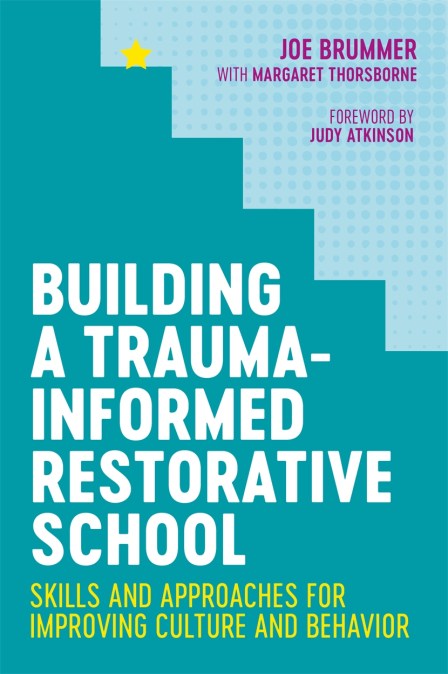Covering both theory and practice, this betselling guide provides educators with everything you need to know about developing restorative and trauma-informed practices within your setting.
Part 1 addresses the theory and philosophy of restorative approaches, and of trauma-informed and trauma-sensitive schools. Part 2 outlines the five restorative skills (mindfulness, honest expression, empathy, the art of asking questions and the art of requests). It shows you what these look like in practice – including using circles, respect agreements and restorative dialogue – and how to implement them. Every strategy is clearly explained and adapted to be appropriate for children and adults who have experienced trauma.
Designed to be adapted for different school settings and their particular challenges, this groundbreaking guide provides you with a trusted roadmap for successfully introducing restorative trauma-informed practice.
Part 1 addresses the theory and philosophy of restorative approaches, and of trauma-informed and trauma-sensitive schools. Part 2 outlines the five restorative skills (mindfulness, honest expression, empathy, the art of asking questions and the art of requests). It shows you what these look like in practice – including using circles, respect agreements and restorative dialogue – and how to implement them. Every strategy is clearly explained and adapted to be appropriate for children and adults who have experienced trauma.
Designed to be adapted for different school settings and their particular challenges, this groundbreaking guide provides you with a trusted roadmap for successfully introducing restorative trauma-informed practice.
Newsletter Signup
By clicking ‘Sign Up,’ I acknowledge that I have read and agree to Hachette Book Group’s Privacy Policy and Terms of Use
Reviews
This book scaffolds what is close to my heart - how to support schools to truly embed the restorative practices, processes and language with the values that underpin the philosophy. Understanding Restorative Practice through this trauma-informed lens promotes empathy, compassion and authentic accountability, one that honours community. I am grateful for all the gems this book offers. Its explicit integration of mindfulness and NVC supports practitioners to truly model this way of being and avoid 'co-opting' RP to promote conformity, misunderstanding it as 'do as I say but I'll ask you nicely'! Instead, the insights and practical supports that Joe shares light the way towards connection and growth - cultivating relational learning communities which is what our schools, and perhaps our lovely world, need now more than ever!
Brummer provides a uniquely rich, thought-provoking, and accessible resource for any educator. He brings a personal and authentic vulnerability, along with a wealth of knowledge and experience to school practices that remain more critical than ever before. I found myself making more personal notes while reading than almost any other book I've read in years.
As an elementary school principal, I confidently say this book is a MUST READ for all educators. The combination of practical and applicable practices grounded in research is what is needed to move forward in becoming a restorative and trauma-informed school!
Joe Brummer has long been established as an expert in Restorative practices and a highly engaging and entertaining presenter. Now he has taken his deep knowledge of the topic of restorative practices and trauma informed education and combined it with his engaging and relational personality. This book is a MUST HAVE for anyone serving children in an education institution. His case study approach and shared stories make this an informational and inspirational read. The "Six Sources of Influence" provide a road map that a school in any geographic area with any demographic of students can follow with great success and outcome. Thank you, Joe, for your courage, your vulnerability, and your deep knowledge of students.
Brummer's book, based on his own healing journey and years as a restorative practitioner, brings a truly cross-disciplinary perspective to restorative practice in schools. Brummer refuses to focus on "fixing broken kids" and instead helps teachers develop a trauma-informed relational pedagogy while answering this question: "Why should we do this?" His integrated approach gives educators a large toolbox from which to draw numerous practices that build positive relationships and create emotionally safe classrooms. If this book doesn't change educators' mindsets about how to best support struggling students, I don't know what will.
Joe Brummer's book is coming out at the perfect time. The world is beginning to understand what is needed to help our students and schools heal. It is an easy to read guide - explaining the why and then giving the reader the skills to do the what.
Joe Brummer has written a personal yet dynamic manual for Trauma Informed Restorative Practices. Brummer has utilized both experience, culture, research and science to ensure a holistic perspective on Restorative Practices for schools. This book goes beyond a process for restorative justice and teaches you how to create safe spaces for every learner. Any educator looking for a comprehensive system to meet the unique needs of their school should begin with this book.
